Islamic State Wants Us to Reject Refugees and Increase Airstrikes
The West's knee-jerk reactions to the Paris attacks are based on ignorance of what the jihadi organization is and what its motives are.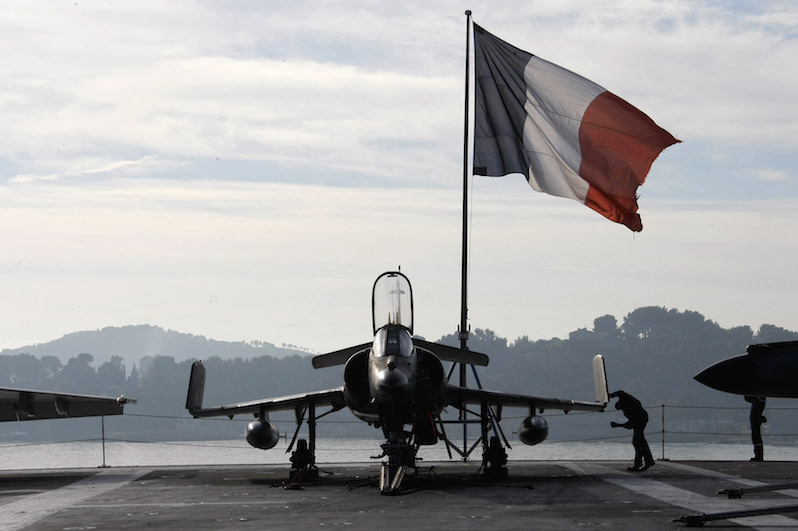 A French sailor checks a Super-Etendard jet on the deck of France's nuclear-powered aircraft carrier Charles de Gaulle on Wednesday. (Claude Paris / AP)
A French sailor checks a Super-Etendard jet on the deck of France's nuclear-powered aircraft carrier Charles de Gaulle on Wednesday. (Claude Paris / AP)
When the brutal attacks in Paris occurred Friday night, social media was immediately abuzz with Facebook “safety checks” and breaking news reports that screamed ever-increasing death tolls in their headlines.
Within 24 hours, people were making snap judgments and publishing lengthy and detailed analyses from various political angles. I thought hard about posting a pithy remark, but as every hour passed, I just couldn’t distill my thoughts fast enough to keep up with the deluge of information. One hundred twenty-nine people were killed in Paris, along with eight terrorists. Less than a day earlier, 43 people were killed in Lebanon, although that attack received far less attention. Islamic State took responsibility for both attacks.
Within 48 hours of the Paris killings, it was reported that a Syrian passport was discovered next to the body of one of the alleged perpetrators, and suddenly the narratives seem to take on a far more sinister tone. It was assumed that the perpetrator—taking advantage of European compassion—had sneaked in amid the tide of refugees entering Europe. That was all the permission that U.S. officials and commentators needed to unleash a wave of reactionary racist rhetoric aimed squarely at refugees whom we have barely begun to welcome to our shores. What this fast-moving tragedy has shown is that the edifice of our current and expanding war initiatives rest on deliberate ignorance.
First, former Arkansas Gov. Mike Huckabee on Saturday referred to the accepting of refugees as “importing terrorism.” On Sunday, another, supposedly moderate Republican contender for the presidential nomination, Jeb Bush, unabashedly suggested that the U.S. ensure that only Christians among Syrian refugees receive asylum. Within hours, the mostly Republican governors of nearly two dozen states rushed to declare that they would defy the federal government and refuse entry to any Syrian refugees. Stewart Baker, a former Department of Homeland Security official under President George W. Bush, offered his equally ugly opinion in the pages of The New York Times, calling for “conscripting military-age Syrian refugees, training them, and sending them back to fight for their own country” because such a measure “would separate true refugees from those who are simply hoping to dodge the Syrian draft or find a more prosperous place to work.”
Ironically it is President Obama who sounds the most reasonable in this debate. Obama called a religious test for refugees “shameful” and added: “That’s not American. That’s not who we are. We don’t have religious tests to our compassion.” Obama also ruled out ground troops in the war against Islamic State, saying “that would be a mistake, not because our military could not march into Mosul or Raqqa or Ramadi and temporarily clear out ISIL, but because we would see a repetition of what we’ve seen before.”
The irony in Obama’s statements lies in the fact that he has pursued a military strategy against Islamic State so aggressive that just a day before the Paris attacks, his administration was lauding the drone attack that reportedly killed the high-profile Islamic State soldier Mohammad Emwazi, nicknamed “Jihadi John.” Within hours, the United Kingdom, where Emwazi was apparently from, was on high alert for possible retaliatory attacks by Islamic State.
In the days before that drone strike, the U.S. reportedly killed scores of Islamic State soldiers in attacks that were covered mostly by non-U.S. press (see here and here). It also supported a Kurdish-led offensive to take back the Iraqi town of Sinjar (in fact the air support for Kurdish forces seems to be the least destructive of all the elements of Obama’s response to Islamic State). This is Obama’s strategy to “contain” Islamic State, an approach with which presidential candidate Hillary Clinton openly disagreed the day after the Paris attacks when she said during the presidential campaign’s second Democratic debate that “ISIS cannot be contained.”
Neither liberals like Obama and Clinton nor conservatives like Huckabee and Bush really understand what drives Islamic State. Their approach is based on almost total ignorance of the shadowy group. But Arab journalists, who have been following the impacts of U.S. policy since the attacks on Sept. 11, 2001, have a better idea. One such newsman is Abdel Bari Atwan, a Palestinian journalist and writer and the longtime editor-in-chief of the London-based pan-Arab newspaper Al-Quds Al-Arabi and currently the editor of Rai Al-Youm news website. Atwan interviewed Osama bin Laden twice in the 1990s and wrote several books including “The Secret History of Al Qaeda” and “After Bin Laden: Al-Qa’ida, the Next Generation.” Atwan’s latest book, this time focusing on Islamic State, is called simply “Islamic State: The Digital Caliphate.” Atwan explained to me in an interview on “Uprising” that although Islamic State appeared on Western radars only about a year ago, the organization had been laying the groundwork for its launch many years earlier:
When the Americans occupied Iraq, [Paul] Bremer, the American military ruler of Iraq, committed grave mistakes when he dissolved the Iraqi army, the security forces, the Republican Guards, and those people were dumped in the streets without any salaries, jobs, and pensions. They were extremely humiliated and turned to Islam and started to group together to make this Islamic State. The irony is that those people were imprisoned in Abu Ghraib prison in Iraq and they met radical Islamists like Abu Bakr Al Baghdadi [the current Islamic State leader] and they joined hands together and started this Islamic State. They are strong simply because when the Syria crisis started, Gulf states like Qatar, Saudi Arabia, Kuwait [U.S. weapons buyers] poured billions of dollars to help the armed opposition to the Syrian regime and the Islamic State actually benefitted from the weapons.
The Western press and officials ignored this development that resulted from Western foreign policy, much in the same way that they ignored the development of the Taliban in Afghanistan and Pakistan in the 1990s. Today, Islamic State is so well established and has such power and wealth that it can no longer be ignored. According to Atwan, when Islamic State “put their hands on more than 14 oil fields in Raqqa and Deir el-Zour in Eastern Syria, they managed to actually accumulate a huge wealth, more than $5 billion.” Foreign Policy confirmed this with a report earlier this year claiming, “The Islamic State, the world’s richest terror group, is reaping millions of dollars a day from selling stolen oil to shady businessmen across the Middle East.”
When the U.S. bombs Islamic State strongholds, as it did before the Paris attacks, and as France is doing now in retaliation, the group uses social media to communicate with its supporters around the world. In fact, Islamic State has one of the most sophisticated communications network of any such non-state organization in the world today. “They have more than 50,000 accounts on Twitter,” said Atwan. “They tweet more than a hundred tweets a day and they have thousands of Facebook pages too. That’s why they are able to spread their propaganda to every corner of the world by the press of a button. They have very highly qualified experts on mass media working with them.”
When the U.S. kills one of their high-profile members, Islamic State members spread the word quickly, using the killing as a recruiting tool. And when they launch attacks like the one in Paris, they apparently are banking on a violent and xenophobic response that in turn drives more desperate people into their arms. The rejection of refugees and the accelerating of airstrikes by the U.S., France and other Western states and allies is exactly what Islamic State wants. Atwan agreed, saying that “after a year and more than 7,000 air sorties, the Americans did not weaken the Islamic State. It was completely the opposite.”
Knowing what Atwan and other Arab journalists know about Islamic State makes Western responses appear counterproductive at best and destructive at worst.
With an uncertain future and a new administration casting doubt on press freedoms, the danger is clear: The truth is at risk.
Now is the time to give. Your tax-deductible support allows us to dig deeper, delivering fearless investigative reporting and analysis that exposes what’s really happening — without compromise.
Stand with our courageous journalists. Donate today to protect a free press, uphold democracy and unearth untold stories.

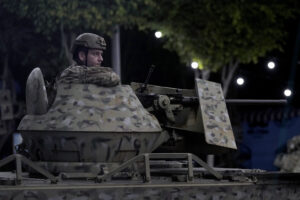
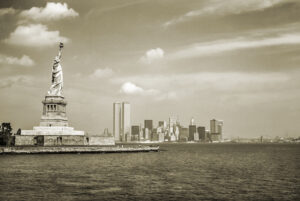
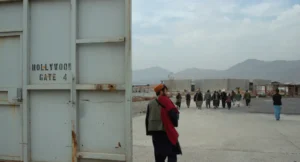
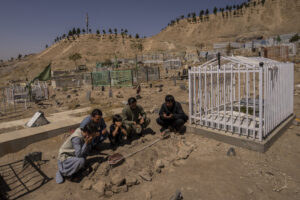




You need to be a supporter to comment.
There are currently no responses to this article.
Be the first to respond.